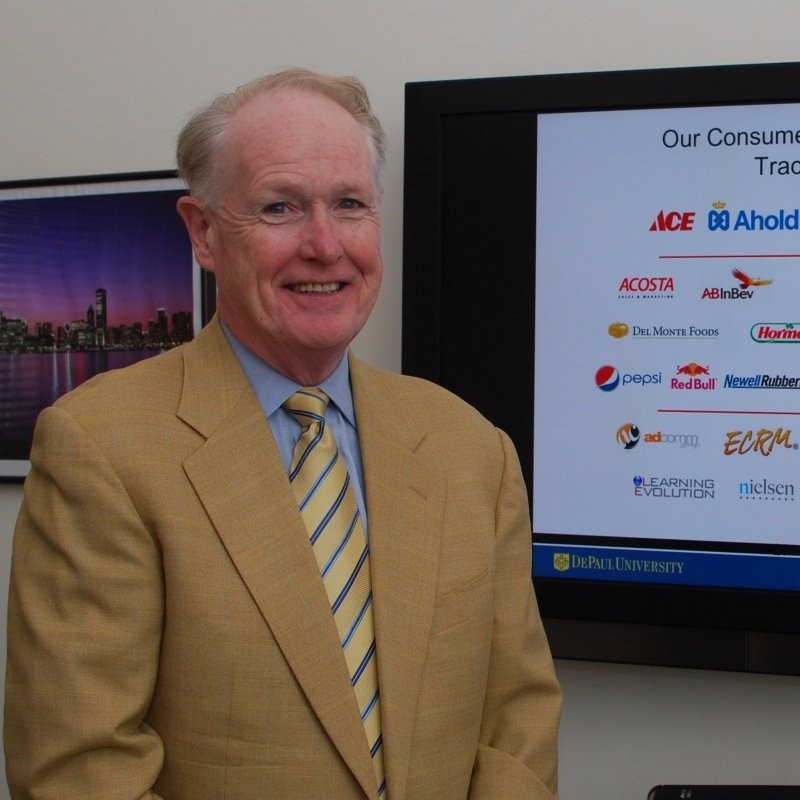
DePaul University's Sales Leadership Program crafts its curriculum to unite the interests of businesses and students, allowing both parties to benefit from a closer relationship. "Our mission is to connect our best prepared students to our partner companies. We really are preparing students for work," explains Executive-in-Residence Dan Strunk, who helped develop the program and manages DePaul's
Center for Sales Leadership.
As the new school year begins, Strunk reflects on how the program is expanding to better serve both its students and its corporate partners.
Adding Big-Name Partners
This fall, the sales program welcomes two new corporations, Walmart and Sam's Club, which brings the total to 56 business partners across three categories (business-to-business, consumer packaged goods and food service). Representatives from the companies approached Strunk when he spoke at an industry conference this summer, and within three months the parties mapped out a year's worth of participation in the sales leadership curriculum.
Strunk says Walmart and Sam's Club wanted to partner with DePaul because they appreciated the category management sequence that the university offers in its sales leadership program. The track's three courses focus on learning the science of retailing, using the industry's technology and solving a real case study. Students examine a business problem for a manufacturing partner within a retail partner's environment and work through it. For example, last term the students explored how to help Walgreens better position its Miller beer products.
For companies, being a partner means providing financial and in-classroom support in exchange for access to talented students and a chance to work within a thriving community of other businesses. For students, having new partners gives more chances to learn about what sales and retail careers today really entail.
"We have a chance to identify new career opportunities for DePaul students that they didn't have before and more paths to success," Strunk says. "Having a Walmart or a Procter & Gamble or a Pepsi on a resume is a bit of magic. Those kinds of companies provide tremendous credibility to an individual working within their organization and make that person far more valuable long term."
Embracing New Approaches
For 2014, the Sales Leadership Program is integrating food service into its category management track. Instead of developing a shelf plan for a retailer, a food service distributor gathers insights on consumer preferences and provides matching products to various businesses (whether restaurants, institutions or government offices). DePaul is the only university sales program to feature food service management, according to Strunk.
DePaul's innovations move beyond curriculum to helping students when they leave the classroom. In traditional job recruiting at other schools, companies rely on the school's reputation to decide whether to recruit sales professionals on campus, then look at grades as an indicator of student quality. "Businesses know very little about curriculum beyond what’s in the brochure, so they're making decision on students based on inadequate information and on inexperience," Strunk says. "That is why normally 40 percent of students hired from universities in sales positions fail in their first year. The failure rate is based on the fact that businesses don’t know how the students think, what leadership skills they possess or how they perform against a particular task."
At DePaul, the collaborative model asks business partners to outline the core competencies they are seeking in job candidates. Then, with the help of business executives in the classroom and as mentors, DePaul students learn exactly what will be needed for their future careers. That sets up a better recruiting environment where students and companies consider each other over a full academic year to determine the best fit.
"As a result, 70 percent of DePaul students go to work for our business partners, and 75 percent of that group are still with their original company three years later," Strunk says. "Those are the kinds of numbers that really matter to a company looking to partner with us."
Read more from Strunk about the Center for Sales Leadership's growth.